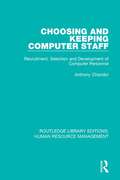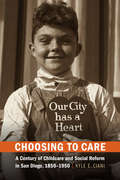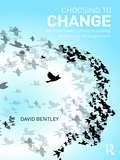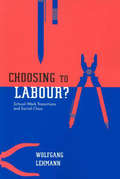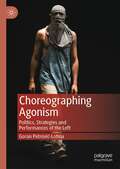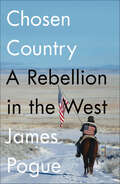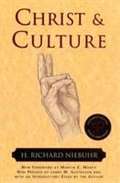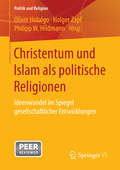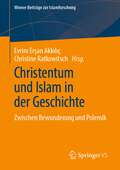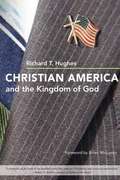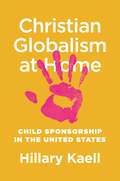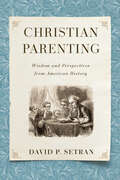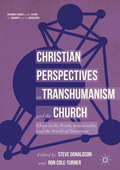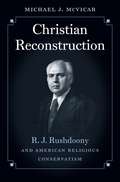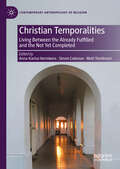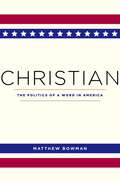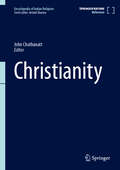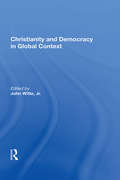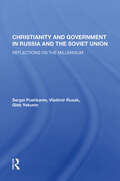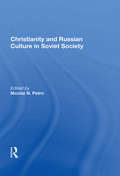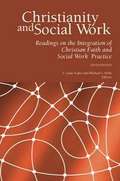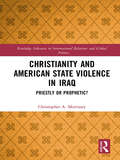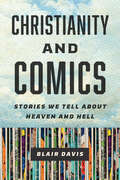- Table View
- List View
Choosing and Keeping Computer Staff: Recruitment, Selection and Development of Computer Personnel (Routledge Library Editions: Human Resource Management)
by Anthony ChandorThis clear and detailed analysis, first published in 1976, of recruitment methods, staff development techniques, staff motivation, and organisational structures will be valuable to data processing managers and personnel officers alike. Its practical flavour and real understanding will also be welcomed by general management. The guidelines and detailed checklists will help cut the direct costs of recruiting and the often astonishingly high indirect costs of rapid staff turnover.
Choosing in Groups
by Michael C. Munger Kevin M. MungerThis book is an introduction to the logic and analytics of group choice. To understand how political institutions work, it is important to isolate what citizens - as individuals and as members of society - actually want. This book develops a means of "representing" the preferences of citizens so that institutions can be studied more carefully. This is the first book to integrate the classical problem of constitutions with modern spatial theory, connecting Aristotle and Montesquieu with Arrow and Buchanan.
Choosing to Care: A Century of Childcare and Social Reform in San Diego, 1850-1950
by Kyle E. CianiIn Choosing to Care, Kyle E. Ciani examines the long history of interactions between parents and social reformers from diverse backgrounds in the development of social welfare programs, particularly childcare, in San Diego, California. Ciani explores how a variety of people—from destitute parents and tired guardians to benevolent advocates and professional social workers—connected over childcare concerns in a city that experienced tremendous demographic changes caused by urbanization, immigration, and the growth of a local U.S. military infrastructure from 1850 to 1950.Choosing to Care examines four significant areas where San Diego’s programs were distinct from, and contributed to, the national childcare agenda: the importance of the transnational U.S.–Mexico border relationship in creating effective childcare programs; the development of vocational education to curtail juvenile delinquency; the promotion of nursery school education; and the advancement of an emergency daycare program during the Great Depression and World War II. Ciani shows how children from families in unstable situations, especially children from Native American, Asian, Mexican-descent, African American, and impoverished Anglo families, challenged a social reform system that defined care as both social control and behavioral regulation.Choosing to Care incorporates a broader definition of childcare to include efforts by governmental and organizational bodies and persons to maintain and nurture the physical, mental, and social health and development of minors when parents and guardians cannot do so. It offers a more complex understanding of how multiple avenues and resources established social welfare in San Diego and other West Coast cities.
Choosing to Change: An Alternative Understanding of Change Management
by David BentleyIt is commonly quoted that the majority of change initiatives fail and equally common is the reasoning that failure is due to a lack of adequate planning and robust processes to deliver change to the organisation. However, organisations cannot change it is only the people in the organisation, and those connected with it, that can change the way they work, think and behave. Choosing to Change takes an alternative view of the change process, applying thinking from the studies of complexity to explore how change in organisations is driven by individual choice. How the totality of our individual experiences and our aspirations for the future shapes our thinking both consciously and unconsciously, setting out an approach that brings change by choice rather than process. It is an exploration of how choice is the basis of all successful change programmes and how that affects the theory of change management. Through the reflections of those who have experienced change. This book tackles how our expectations of the future will determine the choices made and is a vital tool for managers, practitioners and advanced management students.
Choosing to Labour?
by Wolfgang LehmannThrough a qualitative study of academic-track high school students and participants in youth apprenticeships in Germany and Canada, Lehmann shows how the range of available school-work transition options are defined by both gender and social class. Highlighting the importance of the institutional context in understanding school-work transitions, particularly in relation to Germany's celebrated apprenticeship system, which rests on highly streamed secondary schooling and a stratified labour market, Lehmann argues that social inequalities are maintained in part by the choices made by young people, rather than simply by structural forces.
Choosing to Labour?: School-Work Transitions and Social Class
by Wolfgang LehmannYoung people about to leave high school argue that they are determining their own destinies. Scholarly debates also suggest that the influence of structural factors such as social class on an individual's life course is decreasing. Wolfgang Lehmann challenges this view and offers a detailed comparative analysis of the inter-relationships between social class, institutional structures, and individual educational and career choices. Through a qualitative study of academic-track high school students and participants in youth apprenticeships in Germany and Canada, Lehmann shows how the range of available school-work transition options are defined by both gender and social class. Highlighting the importance of the institutional context in understanding school-work transitions, particularly in relation to Germany's celebrated apprenticeship system, which rests on highly streamed secondary schooling and a stratified labour market, Lehmann argues that social inequalities are maintained in part by the choices made by young people, rather than simply by structural forces. Choosing to Labour? concludes with an exploration of how public policy can meet the dual challenge of providing young people with meaningful and equitable educational experiences, while simultaneously fulfilling the need for a skilled workforce.
Choreographing Agonism: Politics, Strategies and Performances of the Left
by Goran Petrović-LotinaIn Choreographing Agonism, author Goran Petrović Lotina offers new insight into the connections between politics and performance. Exploring the political and philosophical roots of a number of recent leftist civil movements, Petrović Lotina forcefully argues for a re-imagining of artistic performance as an instrument of democracy capable of contesting a dominant politics.Inspired by post-Marxist theories of discourse theory, hegemony, conflict, and pluralism, and using tension as a guiding philosophical, political, and artistic force, the book expands the politico-philosophical debate on theories of performance. It offers both scholars and practitioners of performance a thought-provoking analysis of the ways in which artistic performance can be viewed politically as ‘agonistic choreo-political practice,’ a powerful strategy for mobilising alternative ways of living together and invigorating democracy.Choreographing Agonism makes a bold and innovative contribution to the discussion of political and philosophical thought in the field of Performance Studies.
Chosen Country: A Rebellion in the West
by James Pogue"Whoever you are, whatever side you’re on, if you care about the American west and what’s happening to it, read this book."—Caroline Fraser, Pulitzer Prize-winning author of Prairie FiresAn extraordinary inside look at America’s militia movement that shows a country at the crossroads of class, culture, and insurrection.In a remote corner of Oregon, James Pogue found himself at the heart of a rebellion. Granted unmatched access by Ammon Bundy to the armed occupation of the Malheur National Wildlife Refuge, Pogue met ranchers and militiamen ready to die fighting the federal government.He witnessed the fallout of communities riven by politics and the danger (and allure) of uncompromising religious belief. The occupation ended in the shooting death of one rancher, the imprisonment of dozens more, and a firestorm over the role of government that engulfed national headlines. In a raw and restless narrative that roams the same wild terrain as his literary forebears Edward Abbey and Hunter S. Thompson, Pogue's Chosen Country examines the underpinnings of this rural uprising and struggles to reconcile diverging ideas of freedom, tracing a cultural fault line that spans the nation.
Christ and Culture
by H. Richard Niebuhr Martin E. Marty Helmut Richard Niebuhr James GustafsonThis 50th-anniversary edition, with a new foreword by the distinguished historian Martin E. Marty, who regards this book as one of the most vital books of our time, as well as an introduction by the author never before included in the book, and a new preface by James Gustafson, the premier Christian ethicist who is considered Niebuhr's contemporary successor, poses the challenge of being true to Christ in a materialistic age to an entirely new generation of Christian readers.
Christentum und Islam als politische Religionen: Ideenwandel im Spiegel gesellschaftlicher Entwicklungen (Politik und Religion)
by Oliver Hidalgo Philipp W. Hildmann Holger ZapfDer Band untersucht wichtige Stationen des Wandels politisch-religi#65533;ser Ideen im Christentum und im Islam als ideelle Anpassungsleistungen an die sich stetig ver#65533;ndernden gesellschaftlichen Rahmenbedingungen bzw. auch als Gestaltungsversuche des Politischen auf Basis theologischer Pr#65533;missen. Damit leistet das Buch einen zentralen Beitrag zum Verst#65533;ndnis der genuin politischen Dimension von Religionen unabh#65533;ngig von beobachtbaren S#65533;kularisierungsprozessen und m#65533;glichen institutionellen Trennungen zwischen Staat und Kirche. Die versammelten Aufs#65533;tze loten konzeptionelle und methodische Zugangsm#65533;glichkeiten zum Themenfeld aus und erschlie#65533;en den politisch-religi#65533;sen Wandel in Christentum und Islam zum Teil in Einzelfallanalysen, zum Teil in vergleichender Perspektive.
Christentum und Islam in der Geschichte: Zwischen Bewunderung und Polemik (Wiener Beiträge zur Islamforschung)
by Evrim Erşan Akkılıç Christine RatkowitschDieser Band setzt sich in einem interdisziplinären Kontext mit mannigfaltigen Aspekten der Begegnungen zwischen Islam und Christentum in der christlichen und islamischen Geschichte auseinander. Die Spuren dieser Begegnungen reichen weit zurück und lassen sich in historischen, literarischen und theologischen Texten nachverfolgen. Die Beiträge richten einen detaillierten und fokussierten Blick auf die gegenseitigen Wahrnehmungen bzw. Spannungsverhältnisse, die Auswirkungen bis in die heutige Zeit haben.
Christian America and the Kingdom of God
by Richard T. HughesThe idea of the United States as a Christian nation is a powerful, seductive, and potentially destructive theme in American life, culture, and politics. Many fundamentalist and evangelical leaders routinely promote this notion, and millions of Americans simply assume the Christian character of the United States. And yet, as Richard T. Hughes reveals in this powerful book, the biblical vision of the "kingdom of God" stands at odds with the values and actions of an American empire that sanctions war instead of peace, promotes dominance and oppression instead of reconciliation, and exalts wealth and power instead of justice for the poor and needy. With conviction and careful consideration, Hughes reviews the myth of Christian America from its earliest history in the founding of the republic to the present day. Extensively analyzing the Old and New Testaments, Hughes provides a solid, scripturally-based explanation of the kingdom of God--a kingdom defined by love, peace, patience, and generosity. Throughout American history, however, this concept has been appropriated by religious and political leaders and distorted into a messianic nationalism that champions the United States as God's "chosen nation" and bears little resemblance to the teachings of Jesus. Pointing to a systemic biblical and theological illiteracy running rampant in the United States, Hughes investigates the reasons why so many Americans think of the United States as a Christian nation despite the Constitution's outright prohibition against establishing any national religion by law or coercion. He traces the development of fundamentalist Christianity throughout American history, noting especially the increased power and widespread influence of fundamentalism at the dawn of the twenty-first century, embodied and enacted by the administration of President George W. Bush and America's reaction to the terrorist attacks on September 11, 2001.
Christian Globalism at Home: Child Sponsorship in the United States
by Christian Global Hillary KaellAn exploration of how ordinary U.S. Christians create global connections through the multibillion-dollar child sponsorship industryChild sponsorship emerged from nineteenth-century Protestant missions to become one of today’s most profitable private fund-raising tools in organizations including World Vision, Compassion International, and ChildFund. Investigating two centuries of sponsorship and its related practices in American living rooms, churches, and shopping malls, Christian Globalism at Home reveals the myriad ways that Christians who don’t travel outside of the United States cultivate global sensibilities.Kaell traces the movement of money, letters, and images, along with a wide array of sponsorship’s lesser-known embodied and aesthetic techniques, such as playacting, hymn singing, eating, and fasting. She shows how, through this process, U.S. Christians attempt to hone globalism of a particular sort by oscillating between the sensory experiences of a God’s eye view and the intimacy of human relatedness. These global aspirations are buoyed by grand hopes and subject to intractable limitations, since they so often rely on the inequities they claim to redress.Based on extensive interviews, archival research, and fieldwork, Christian Globalism at Home explores how U.S. Christians imagine and experience the world without ever leaving home.
Christian Parenting: Wisdom and Perspectives from American History
by David P. SetranWhat can the past teach us about what it means to be a &“good&” Christian parent today? Today&’s parenting guidance can sometimes feel timeless and inviolable—especially when it comes to the spiritual formation of children in Christian households. But even in the recent past, parenting philosophies have differed widely among Christians in ways that reflect the contexts from which they emerged. In this illuminating historical study, David Setran catalogs the varying ways American Protestants envisioned the task of childrearing in the seventeenth, eighteenth, and nineteenth centuries. Comparing two main historical time periods—the colonial era and the Victorian era—Setran uncovers common threads, opposing viewpoints, and the cultural and religious influences behind the dominant parenting &“postures&” of each era. The implications of his findings matter for today&’s big questions about parenting:Should children be viewed as basically good, in need of protection from corruption, or as fundamentally sinful, in need of moral correction?How should parents address misbehavior?Should a parent&’s primary role be that of teacher, disciplinarian, or nurturer?What importance should be attributed to devotions and prayer, church involvement, Sabbath-keeping, home decorating, and fun family activities?What consideration should be given to gender? Should boys and girls be raised differently? Do mothers and fathers have essentially different responsibilities?As he surveys these historical perspectives, Setran reflects on the legacy and future of Christian parenting, concluding that the Protestant heritage encourages the importance of intentional devotional practices, the development of close parent-child bonds, and the creation of godly household environments. In the end, he argues that all of these historical values are critical to the full expression of Christian parental love. This is a love that teaches because it wants to help children understand true goodness; that admonishes and restrains because it wants to protect children from whatever keeps them from true pleasure and joy; that fosters strong relationships so children might experience the lavishness of God&’s love; that models Christlike sacrifice and guides children into the arms of their Creator.
Christian Perspectives on Transhumanism and the Church: Chips In The Brain, Immortality, And The World Of Tomorrow (Palgrave Studies In The Future Of Humanity And Its Successors Ser.)
by Steve Donaldson Ron Cole-TurnerChristians have always been concerned with enhancement—now they are faced with significant questions about how technology can help or harm genuine spiritual transformation. What makes traditional and technological enhancement different from each other? Are there theological insights and spiritual practices that can help Christians face the challenge of living in a technological world without being dangerously conformed to its values? This book calls on Christians to understand and engage the deep issues facing the church in a technological, transhumanist future.
Christian Reconstruction
by Michael Joseph McvicarThis is the first critical history of Christian Reconstruction and its founder and champion, theologian and activist Rousas John Rushdoony (1916-2001). Drawing on exclusive access to Rushdoony's personal papers and extensive correspondence, Michael J. McVicar demonstrates the considerable role Reconstructionism played in the development of the radical Christian Right and an American theocratic agenda. As a religious movement, Reconstructionism aims at nothing less than "reconstructing" individuals through a form of Christian governance that, if implemented in the lives of U.S. citizens, would fundamentally alter the shape of American society.McVicar examines Rushdoony's career and traces Reconstructionism as it grew from a grassroots, populist movement in the 1960s to its height of popularity in the 1970s and 1980s. He reveals the movement's galvanizing role in the development of political conspiracy theories and survivalism, libertarianism and antistatism, and educational reform and homeschooling. The book demonstrates how these issues have retained and in many cases gained potency for conservative Christians to the present day, despite the decline of the movement itself beginning in the 1990s. McVicar contends that Christian Reconstruction has contributed significantly to how certain forms of religiosity have become central, and now familiar, aspects of an often controversial conservative revolution in America.
Christian Temporalities: Living Between the Already Fulfilled and the Not Yet Completed (Contemporary Anthropology of Religion)
by Simon Coleman Matt Tomlinson Anna-Karina HermkensThis volume explores how different forms of Christianity shape people's visions of pasts and futures, and how the transcendent is brought into human time. Beyond conventional discussions around breaks with the past in Christian conversion and future ruptures announced in prophecy, the volume reveals previously unexplored ways in which Christians work with concepts of time and its articulation with divinity, subjectivity, agency, and personal, social, and political change. By developing Coleman’s argument about “historiopraxy” in novel directions, contributors provide new understandings of religious temporalities and the ritual articulation of immanence and transcendence. While building upon previous scholarly work in the anthropology of Christianity, this volume pushes the debate further and provides original insights into how religion is mobilised to shape and transform people's pasts, presents and futures.
Christian: The Politics of a Word in America
by Matthew BowmanReligious diversity has long been a defining feature of the United States. But what may be even more remarkable than the sheer range of faiths is the diversity of political visions embedded in those religious traditions. Matthew Bowman delves into the ongoing struggle over the potent word “Christian,” not merely to settle theological disputes but to discover its centrality to American politics. As Christian: The Politics of a Word in America shows, for many American Christians, concepts like liberty and equality are rooted in the transcendent claims about human nature that Christianity offers. Democracy, equality under the law, and other basic principles of American government are seen as depending on the Christian faith’s sustenance and support. Yet despite this presumed consensus, differing Christian beliefs have led to dispute and disagreement about what American society and government should look like. While many white American Protestants associate Christianity with Western Euro-American civilization, individual liberty, and an affirmation of capitalism, other American Christians have long rejected those assumptions. They maintain that Christian principles demand political programs as wide-ranging as economic communalism, international cooperation, racial egalitarianism, and social justice. The varieties of American Christian experience speak to an essentially contested concept of political rights and wrongs. Though diverse Christian faiths espouse political visions, Christian politics defy clear definition, Bowman writes. Rather, they can be seen as a rich and varied collection of beliefs about the interrelationships of divinity, human nature, and civic life that engage and divide the nation’s Christian communities and politics alike.
Christianity (Encyclopedia of Indian Religions)
by John ChathanattPublished in the Series Encyclopedia of Indian Religions, this volume is devoted to Christianity in India, where it has had a long presence, going back to the time of the apostles of Jesus Christ. Divided into two parts, this volume focuses on the history, origin, organizations and local engagements, belief system, worship practices, Rites, Rituals, Christian life, Contributions, Spirituality and a few of the main doctrinal items. The Second Part covers the doctrinal and theological arena. It examines the earlier phase of the history of Christianity starting with the traditional belief of the arrival of St. Thomas in AD 52, moving to the periods of its association with the Chaldean church, the Portuguese, the Dutch, English and so on. This volume highlights the missionary activities of persons like St. Francis Xavier, the creative contributions made to the inter-religious dialogue by such people as Roberto de Nobili (1577-1656) and Swami Abhishiktananda (1910-1973), the linguistic and educational contributions of some of the pioneers like the German Jesuit Johanne Ernst Hanxleden (known as Arnos Padiri) (1681-1732), Herman Gundert (1814-1893), St. Elias Kuriakos Chavara (1805-1871), and, a fortiori, the enormous contributions in the healthcare area throughout the country. Caring for and serving the socio-economically marginalized ones, the peripheralized people formed an integral part of the Christian activity In India, as it is done even today. This is highlighted very much in the volume. It, further, explores the contact India had with European Christianity, showing that European Christianity proved to have wider influence in the Norther part of India, unlike India’s early episodic encounters with Palestinian and Persian forms of Christianity, which had deep influence in the Southern part of India. The volume also highlights the inner struggle among the followers resulting even in its division originating at the Synod of Diamper in 1599 manifesting, by and large, the Church-state ‘love and hate’ relationships. In fine, in spite of the drawbacks of putting the herculean task of two thousand years of history in eight hundred pages or so, this volume gives a rather comprehensive view of Christianity in India especially to those who are unfamiliar with its life and dynamics in the Indian context. The wide range of photographs, especially of the churches revealing the architectural beauty and multiplicity along with the ensample of art and paintings and pilgrimage centers adds to the enrichment of the volume.
Christianity And Democracy In Global Context
by John WitteIn the past, Christianity has had both positive and negative influences on democracy. Christian churches have served as benevolent agents of welfare and catalysts of political reform. But they have also served as belligerent allies of repression and censors of human rights. Christian theology has helped to cultivate democratic ideas of equality, li
Christianity And Government In Russia And The Soviet Union: Reflections On The Millennium
by Sergei PushkarevTranslated from the Russian. These essays were written over the course of more than 40 years. Their authors--Pushkarev, Rusak, and Yakunin--have all been exiled or imprisoned for their outspoken views.
Christianity And Russian Culture In Soviet Society
by Nicolai N. PetroThis book is the product of a three-day conference at the Monterey Institute of International Studies. It focuses on the tension between the expression of Christian beliefs and the legal restrictions imposed on professions of faith and the importance of Christian culture to perestroika.
Christianity And Social Work: Readings On The Integration Of Christian Faith And Social Work Practice (fifth Edition)
by T. Laine Scales Michael S. KellyChristianity and Social Work is written for social workers whose motivations to enter the profession are informed by their Christian faith, and who desire to develop faithfully Christian approaches to helping.
Christianity and American State Violence in Iraq: Priestly or Prophetic? (Routledge Advances in International Relations and Global Politics)
by Christopher A. MorrisseyThe world continues to be threatened by non-state, religiously-rationalized violence. While some fail to the see the connections between the United States’ intervention in the Middle East and this ongoing threat, the non-state perpetrators of terror consistently identify American meddling as one of their principle motivating grievances. What are the social and cultural roots of different religious positions on the war in Iraq? Christianity and American State Violence in Iraq returns to a critical moment in U.S. foreign policy, during which American Christians publicly debated war in Iraq. It examines the religious precepts that were used to argue both for and against the United States’ military engagement in Iraq. To capture this behavior, Christopher A. Morrissey delves into the distinct social and cultural origins of both war-supporting and war-challenging positions. His analysis represents an improved understanding of the public role of religion in important foreign policy debates and helps us better understand how religious culture can legitimate or challenge state violence. An original and timely resource on the social sources of religion’s ambivalence towards violence and peace in the US and abroad.
Christianity and Comics: Stories We Tell about Heaven and Hell
by Blair DavisThe Bible has inspired Western art and literature for centuries, so it is no surprise that Christian iconography, characters, and stories have also appeared in many comic books. Yet the sheer stylistic range of these comics is stunning. They include books from Christian publishers, as well as underground comix with religious themes and a vast array of DC, Marvel, and Dark Horse titles, from Hellboy to Preacher. Christianity and Comics presents an 80-year history of the various ways that the comics industry has drawn from biblical source material. It explores how some publishers specifically targeted Christian audiences with titles like Catholic Comics, books featuring heroic versions of Oral Roberts and Billy Graham, and special religious-themed editions of Archie. But it also considers how popular mainstream comics like Daredevil, The Sandman, Ghost Rider, and Batman are infused with Christian themes and imagery. Comics scholar Blair Davis pays special attention to how the medium’s unique use of panels, word balloons, captions, and serialized storytelling have provided vehicles for telling familiar biblical tales in new ways. Spanning the Golden Age of comics to the present day, this book charts how comics have both reflected and influenced Americans’ changing attitudes towards religion.
